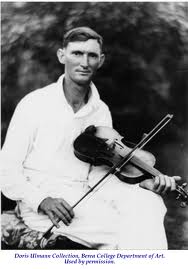Annotation:Indian Squaw (2): Difference between revisions
m (Text replacement - "garamond, serif" to "sans-serif") |
No edit summary |
||
| Line 1: | Line 1: | ||
== | __NOABC__ | ||
<div class="noprint"> | |||
<p><font face="Century Gothic" size="4"> Back to [[{{BASEPAGENAME}}]] </font></p> | |||
</div> | |||
---- | ---- | ||
<p><font face=" | {{#lst:{{PAGENAME}}|abc}} | ||
'''INDIAN SQUAW [2]'''. | ---- | ||
<div style="page-break-before:always"></div> | |||
<p><font face="Century Gothic" size="3"> | |||
<div style="text-align: justify; direction: ltr; margin-bottom: 90px; margin-left: 70px; margin-right: 120px;"> | |||
<br> | |||
'''INDIAN SQUAW [2]'''. American, Reel. G Major. GDad tuning (fiddle). AB. Some similarities to Alva Greene's version (see "[[Indian Squaw (1)]]"). Hiram Stamper's [http://www.berea.edu/hutchinslibrary/specialcollections/stamper.asp] (1883-1992) archaic version apparently was derived from a song. Stamper whistled to the 'B' part of the tune, and sang to the 'A' part: | |||
<blockquote> | <blockquote> | ||
''Way down yonder on the Arkansas,'' <br> | ''Way down yonder on the Arkansas,'' <br> | ||
| Line 12: | Line 20: | ||
<br> | <br> | ||
<br> | <br> | ||
</div> | |||
</font></p> | </font></p> | ||
<p><font face=" | <div class="noprint"> | ||
''Source for notated version'': Hiram Stamper (Hindman, Knott County, Ky., 1986) [Titon]. | <p><font face="Century Gothic" size="3"> '''Additional notes''' </font></p> | ||
<p><font face="Century Gothic" size="3"> | |||
<font color=red>''Source for notated version''</font>: - Hiram Stamper (Hindman, Knott County, Ky., 1986) [Titon]. | |||
<br> | <br> | ||
<br> | <br> | ||
</font></p> | </font></p> | ||
<p><font face=" | <p><font face="Century Gothic" size="3"> | ||
''Printed sources'': | <font color=red>''Printed sources''</font> : - Titon (Old-Time Kentucky Fiddle Tunes), 2001; No. 69C, p. 99. | ||
<br> | <br> | ||
<br> | <br> | ||
</font></p> | </font></p> | ||
<p><font face=" | <p><font face="Century Gothic" size="3"> | ||
''Recorded sources'': <font color=teal> | <font color=red>''Recorded sources'': </font> <font color=teal> - </font> | ||
<br> | <br> | ||
<br> | <br> | ||
</font></p> | </font></p> | ||
<p><font face="sans-serif" size=" | <p><font face="sans-serif" size="3"> | ||
See also listing at:<br> | See also listing at:<br> | ||
Hear Stamper's 1986 field recording by Bob Butler at Berea | Hear Stamper's 1986 field recording by Bob Butler at Berea Sound Archives [https://soundarchives.berea.edu/items/show/901] and at Slippery Hill [https://www.slippery-hill.com/recording/indian-squaw-2]<br> | ||
</font></p> | </font></p> | ||
<br> | <br> | ||
---- | ---- | ||
== | <p><font face="Century Gothic" size="4"> Back to [[{{BASEPAGENAME}}]] </font></p> | ||
</div> | |||
__NOEDITSECTION__ | |||
__NOTITLE__ | |||
Revision as of 02:50, 4 November 2019
X:1 T:Indian Squaw [2] T:Two Little Indians and One Old Squaw N:From the playing of Knott County, east Kentucky, fiddler Hiram Stamper (1893-1991), N:recorded in the field in 1986 by Bob Butler M:C| L:1/8 N:Play with some 'swing' R:Reel D:https://www.slippery-hill.com/content/two-little-indians-and-one-old-squaw Z:Transcribed by Andrew Kuntz K:G B2-d2 d2d2|d2 d=f- e2d2|[G,3G3]A B2d2|d2de d2B2|A2G2 (D2 EF)| D8|B2dd dd d2-|d2 fd e2d2|B2-Bd (3BdB AA| G2 AB A2G2E3c| BGAG GB3|A2G2E2c2|(3BcB AG GGBG- |D2E2 {E}[G,3G3]B| BGAG EE [GB]A|G2 AG EE ([Ec]A)|(3BcB AG GGBG- |D2E2 (G,G3)|[M:2/4] G4||
INDIAN SQUAW [2]. American, Reel. G Major. GDad tuning (fiddle). AB. Some similarities to Alva Greene's version (see "Indian Squaw (1)"). Hiram Stamper's [1] (1883-1992) archaic version apparently was derived from a song. Stamper whistled to the 'B' part of the tune, and sang to the 'A' part:
Way down yonder on the Arkansas,
Two old Indians and one old squaw,
Sitting on the banks of the Arkansas.
Jeff Titon (2001) finds nearly the same lyric in a song called "Bank of the Arkansas (The)" printed in Lomax and Lomax's Our Singing Country (1941, pp. 68-69), although Titon says tune that appears with that song is the same as that of Clyde Davenport's "Cornstalk Fiddle and a Shoestring Bow."

